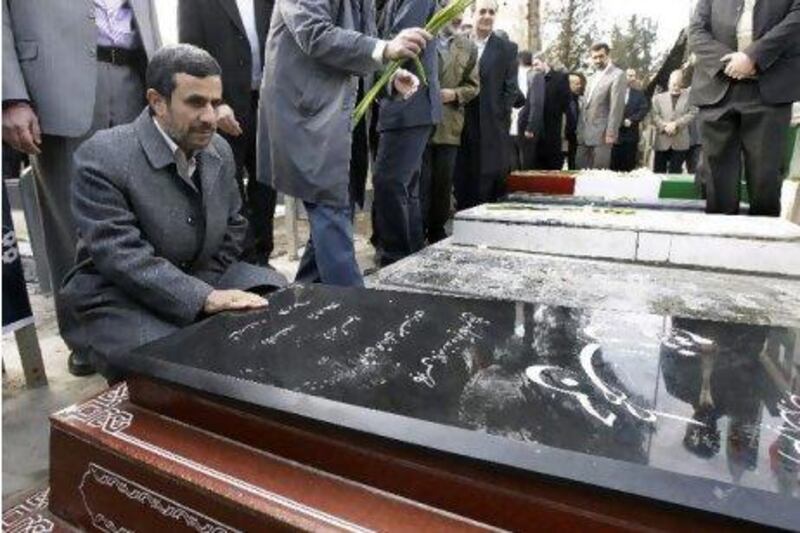TEL AVIV // Several Israeli leaders suggested last week that Israel is seriously considering military strikes on Iran's nuclear programme, claiming the world is running out of time to halt Tehran from building nuclear arms.
Ehud Barak, the defence minister, said at a security forum on Thursday that if western sanctions against Iran fail, "there will arise the need of weighing an operation."
Moshe Yaalon, a deputy prime minister, said at the same conference that the world needs a "credible military option" to stop Iran's nuclear plans. Benny Gantz, the army chief, said on Wednesday that Israel must be "willing to deploy" its military because Iran may be capable of developing nuclear arms within a year.
Such statements are fuelling debate on what has become a burning question about Israel in the international arena: whether the country will launch an attack on Iran soon.
The speculation has been rife amid a flurry of articles suggesting Israel would strike in coming months. The Washington Post reported Thursday that the biggest worry of Leon Panetta, the US defence secretary, is that Israel may attack as early as April. Ronen Bergman, an Israeli journalist, concluded in a New York Times Magazine story last week that after speaking with top political, military and intelligence officials in Israel, he has "come to believe that Israel will indeed strike Iran in 2012."
Some former military officials say Israel may indeed have good reason to launch a strike soon. Shlomo Brum, a retired Israeli general and now a security analyst, said Tehran, that insist it only seeks reactors for energy and medical research, already has all the technology it needs to build nuclear bombs and only needs a nod from its rulers to begin constructing them. Furthermore, he added that Israel is concerned that Iran's programme may be entering an "immunity zone" in which crucial elements of it may be placed underground beyond the reach of Israel's bombs.
"I think the Israeli leadership is considering this idea very seriously," Mr Brum said in an interview with The National. "Such an attack is not capable of stopping the programme, so the question is, how much of a delay to it can a strike achieve."
While Israeli leaders claim Iran is their country's biggest threat, some experts say the motive for such an operation is not necessarily because Iran poses a significant security danger to Israel.
Indeed, some analysts say that Israeli prime minister Benjamin Netanyahu may try to bolster his political standing ahead of possible elections later this year by ordering an attack and betting on its success. The next ballot is not scheduled until 2013 but Mr Netanyahu is believed to be mulling calling for earlier elections - as early as September of October - to take advantage of a wave of popularity.
Furthermore, they say Mr Netanyahu may be pressured to act militarily against Tehran to avoid having Israel lose credibility after at least six years of conveying threats that it may strike Iran.
"Netanyahu may decide to fortify his position by attacking Iran, and if he gets away with it then he can call early elections and win big time," said Martin van Creveld, one of Israel's most prominent military experts.
Israel may also "find itself in a corner," Mr van Creveld said. "How many times can you repeat a threat and not carry it out? Israel cannot threaten endlessly without losing credibility."
Mr Netanyahu, according to analysts, may be following in the footsteps of Menachem Begin, a former prime minister and one of his mentors within the ruling right-wing Likud party. In 1981, Mr Begin won the premiership in general elections that took place just weeks after he ordered a surprise strike on Iraq's nuclear reactor, despite trailing in the polls during much of the campaigning.
Mr van Creveld added that Israel may also be using the threat of Iran to continue obtaining annually some US$3 billion (Dh11bn) in mostly military assistance from the US and army equipment from countries such as Germany. "For over a century, Zionist leaders have made a focus on having an enemy to get foreign aid - first it was the Arabs and Palestinians and then the Iranians. No other country has been so successful at getting so many weapons for free."
In recent days, the country's leaders have bolstered their warnings about Iran posing an existential threat to Israel as well as to the rest of the world.
Mr Yaalon told the gathering that a missile testing site near Tehran - hit three months ago by a mysterious explosion that spurred speculation of Israeli involvement - had been developing missiles with a range of about 10,000 kilometres that could reach the US. Aviv Kochavi, head of Israel's military intelligence, told the same gathering that Iran is close to enriching enough uranium to develop four atom bombs. The Israeli general also estimated that Israel has some 200,000 missiles aimed at it from its enemies at any given time.
A military strike is likely to be supported by most voters - whether on the right, centre or left - in Israel, where there has been very little debate about whether Iran poses a significant threat to the country.
"There is a broad agreement over Iran because of the propaganda by top Israeli officials about Iran being a big threat and because of the Holocaust trauma of many Israelis," said Haggai Ram, an Iran specialist at Ben-Gurion University.
vbekker@thenational.ae






